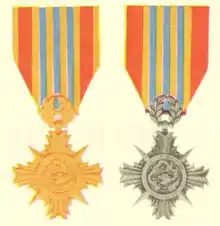| Armed Forces Honor Medal | |
|---|---|
 Armed Forces Honor Medals (First class badge on the left & second class on the right) | |
| Type | Medal (two-class decoration) |
| Presented by | South Vietnam |
| Eligibility | Military personnel of South Vietnam and foreign entities |
| Campaign(s) | Actively contributing to the formation and organization of the Vietnamese military and actively participated in cadre training of Vietnamese units |
| Status | No longer awarded |
| Established | January 7, 1953 |
First class ribbon Second class ribbon | |
| Order of Wear | |
| Next (higher) | Republic of Vietnam Wound Medal |
| Next (lower) | Leadership Medal |
The Republic of Vietnam Armed Forces Honor Medal (Vietnamese: Danh-Dự Bội-Tinh) was a military decoration of South Vietnam that was first created on January 7, 1953. The medal was awarded in two classes and reached its height of bestowal during the Vietnam War. It was frequently awarded to members of foreign militaries, including military advisors of the United States Armed Forces.
The Armed Forces Honor Medal was awarded to any member of the military who actively contributed to the formation and organization of the Vietnamese military in South Vietnam and who actively participating in cadre training of Vietnamese units.[1] It was intended for non-combat achievements.
The first-class medal was awarded to commissioned officers and the second class medals were awarded to warrant officers and enlisted personnel. The first-class medallion is gold and the second class' silver. Suspension and service ribbons for the two grades were distinguished by a gold and red pattern for the first class and two red patterns reaching each side on the second class. Both ribbons had three central light blue vertical stripes.
Today, the medal is only available from private dealers in military insignia.
Notable recipients
References
- ↑ Huy Chương Ân Thưởng Trong Quân-Lực Viêt-Nam Cộng-Hòa (Medals and Decorations of the Republic of Vietnam Armed Forces). Government of the Republic of Vietnam. 1967. Retrieved 30 August 2016.
External links
 Media related to Armed Forces Honor Medal at Wikimedia Commons
Media related to Armed Forces Honor Medal at Wikimedia Commons- Military Orders, Decorations, and Medals of the Republic of Vietnam